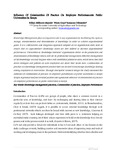| dc.contributor.author | Maende, Billiah Millicent | |
| dc.contributor.author | Guyo, Wario | |
| dc.contributor.author | Odhiambo, Romanus | |
| dc.date.accessioned | 2021-10-26T14:10:31Z | |
| dc.date.available | 2021-10-26T14:10:31Z | |
| dc.date.issued | 2021-06 | |
| dc.identifier.uri | http://ir.mksu.ac.ke/handle/123456780/8106 | |
| dc.description.abstract | Knowledge Management plays an important role in any organization by facilitating the capture, storage, transformation and dissemination of knowledge in order to achieve organizational goals. It is a collaborative and integrated approach adopted on an organization-wide basis to ensure that an organization’s knowledge assets are best utilized to increase organizational performance. Universities as ‘knowledge intensive’ organizations thrive on the production and dissemination of knowledge which calls for its professional management. Effective management of this knowledge can only happen when well-established platforms exist, which have clear laid down strategies and policies on how employees can share their know-how. Communities of practice is a knowledge management practice that can be used to encourage knowledge sharing among employees in universities. Through descriptive research design the study examined the influence of communities of practice on employee performance in public universities in Kenya Simple regression analysis revealed positive and significant influence of communities of practice on employee performance in public universities in Kenya. | en_US |
| dc.language.iso | en_US | en_US |
| dc.publisher | Machakos University Press | en_US |
| dc.subject | Knowledge management practices | en_US |
| dc.subject | Communities of practice | en_US |
| dc.subject | Employee Performance | en_US |
| dc.title | Influence Of Communities Of Practice On Employee Performancein Public Universities In Kenya | en_US |
| dc.type | Article | en_US |

